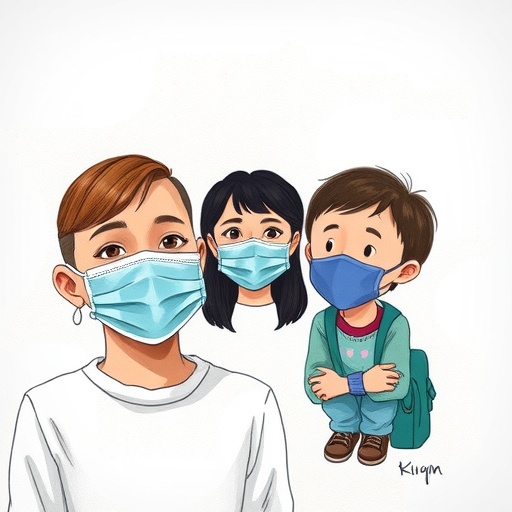The COVID-19 pandemic reshaped global society in unprecedented ways, influencing not only physical health but also the psychological and developmental trajectories of individuals and families. A recent comprehensive qualitative case study conducted by researchers at the University of Illinois Urbana-Champaign offers an in-depth look into the nuanced experiences of youth and parents across the U.S. Midwest during this turbulent period. By engaging directly with the lived realities of 479 participants, this investigation illuminates both the widespread adversities faced and the unexpected silver linings that emerged amid a global health crisis.
Central to the study is the disruption the pandemic caused to the established structures and rhythms of daily life, which in turn altered developmental patterns and social interactions. Public health mandates, social isolation, and economic instability formed a confluence of stressors impacting families’ psychological well-being. Yet these same constraints demanded adaptability, sparking creativity and recalibration within households as they developed novel strategies to navigate their new realities. These adaptive processes revealed substantial heterogeneity in how families coped and evolved during the pandemic.
One particularly compelling insight involves the accelerated maturity and personal development reported by many children. Parents observed shifts whereby youths demonstrated enhanced empathy, self-reliance, and responsibility sooner than anticipated. These changes suggest that, despite adversity, the pandemic environment catalyzed growth in social-emotional competencies in some individuals. However, these developmental advances coexisted with pressure experienced by youths to assume adult-like roles prematurely, indicating complex psychosocial trade-offs in pandemic-era maturation.
Conversely, the research highlights that not all developmental trajectories were positively affected. A notable proportion of parents reported discernible delays in areas such as speech acquisition and social skills, especially in younger children deprived of typical peer interaction through daycare closures and social distancing protocols. This finding underscores the critical role of social contexts in early childhood development and signals potential long-term ramifications of pandemic-related restrictions on educational and social domains.
The study further elucidates the pervasive mental health consequences wrought by the pandemic, with anxiety and depression emerging as recurrent themes across age groups. Adults and adolescents alike grappled with fears of illness and mortality, compounded by intensified social isolation. Vulnerable populations, including pregnant women navigating remote healthcare and mothers of young children, reported pronounced emotional distress, spotlighting the intersection of physical health risks and psychosocial burdens during crises.
Loss and grief permeated the collective experience, extending beyond bereavement to encompass the symbolic mourning of missed social milestones and routines. The absence of communal celebrations such as graduations and birthdays deprived many of critical rites of passage, exacerbating feelings of disconnection and disrupting social cohesion. These losses reverberate beyond immediate emotional impacts, hinting at enduring effects on community bonds and individual identity formation.
Family dynamics underwent significant realignment as a consequence of pandemic conditions. While some households embraced the opportunity for increased togetherness and the cultivation of shared activities, others faced heightened stress due to overlapping demands of work and childcare. This duality reflects the complex interplay between environmental pressures and intra-familial relationships, emphasizing the variability of pandemic impacts contingent upon contextual factors.
Moreover, divergent beliefs surrounding pandemic mitigation measures, particularly around mask mandates and vaccination, led to strained interpersonal relationships. Ideological divides seeded conflict within families, social circles, and workplaces, leading to reduced communication and fractured ties. Such schisms reveal the potent influence of public health discourse on social fabrics and highlight the challenge of maintaining unity amid polarized responses to crisis management.
In response to these multifaceted stresses, adaptive and maladaptive coping mechanisms emerged within the population. Some individuals pursued therapeutic interventions or pharmacological support, illustrating the benefits of accessible mental health resources. Others resorted to harmful behaviors such as substance misuse or excessive gaming, signaling the necessity of nuanced public health strategies that recognize and address diverse coping modalities.
The sudden transition to online schooling introduced an additional layer of complexity. Families faced steep learning curves, requiring parents to assume educational responsibilities while contending with technological challenges and inequities. These conditions accentuated existing disparities in digital access and educational resources, suggesting that the pandemic not only disrupted learning but also magnified systemic inequities within educational systems.
Reactions to pandemic mandates themselves varied markedly. While some found reassurance in the availability of vaccines and public health measures, others perceived these interventions as infringements on personal liberties, fostering distrust toward governmental and health authorities. This divergence underscores the critical importance of trust-building and tailored communication strategies in public health policy to enhance compliance and social solidarity during emergencies.
The study’s findings advocate for a paradigm shift in public health response frameworks. Recognizing the heterogeneity of experiences and values is paramount; one-size-fits-all approaches neglect the intricacies of individual and community needs. The researchers emphasize engagement that prioritizes listening without judgment and rebuilding trust as foundational to effective pandemic preparedness and response.
Importantly, the research also identifies disparities in pandemic impact rooted in pre-existing systemic inequities. Populations equipped with social and economic resources demonstrated greater resilience, whereas essential workers and economically strained individuals experienced disproportionate hardships. This reinforces the urgency of addressing structural inequalities to fortify society against future health crises.
In conclusion, this in-depth qualitative analysis furnishes vital insights into the multifaceted consequences of the COVID-19 pandemic on families and youth. It highlights the coexistence of trauma and growth, challenges and adaptations, emphasizing the resilience of individuals while calling for systemic improvements. As policymakers and health professionals contemplate future pandemic scenarios, this research underscores the imperative of equitable, nuanced, and empathetic strategies that honor diverse lived experiences.
Subject of Research: People
Article Title: Covid Was a Worldwide Pandemic That Caused Trauma for Everyone… There Were Also ‘Silver-linings’” – Adult and Youth Qualitative Perspectives
News Publication Date: 16-May-2025
Web References: https://doi.org/10.29333/ajqr/16281
References: Dariotis, J.K., Smith, R., Eldreth, D., et al. (2025). Covid Was a Worldwide Pandemic That Caused Trauma for Everyone… There Were Also ‘Silver-linings’” – Adult and Youth Qualitative Perspectives. American Journal of Qualitative Research. DOI: 10.29333/ajqr/16281.
Keywords: Human health, Public health, Social sciences




